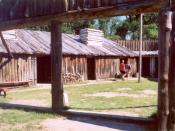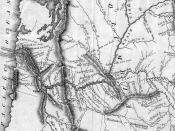Lewis and Clark are the most well-known explorers in the world. Their infamous expedition was primarily concerned with Indian affairs. It was very important to gain the loyalty and friendship of these tribes for economic as well as military and political reasons. Therefore, President Jefferson instructed Lewis and Clark to make friends and develop trade relations with these Indians as well as collect scientific and military information about them. (Viola). Even though the "intentions" were to establish American trade with the tribes, it truly was not. Essentially, the plan was to gain control of the United States, so that one government could control it, so they set out to create a chain of friendships to accomplish this expedition and they were known as "The Corps of Discovery".
The ultimate goal, then, of the Lewis and Clark Expedition was the subjugation of Indian property and commercial rights. The expedition would help the United States claim its discovery sovereignty over the Louisiana Territory; institute concrete plans to begin exercising that authority and extended America's claim to the Northwest.
The expedition was a major part of Jefferson's plan to assimilate Indians and their assets into American society, to remove the tribes from the path of American continental expansion and, if necessary, to exterminate the tribes to advance the American empire. (Miller)
During their journey to the Pacific Ocean, Lewis and Clark traveled through three different culture areas: the Plains, Plateau, and Northwest Coast. (Viola) Throughout their exploration, they encountered many different types of Indian tribes. Some of the Plains tribes they met were the Osage, Sioux, Cheyenne, Crow, and Mandan. The Plateau Indians were the Blackfeet, Flathead, Shoshone, Nez Perce, Spokane, and Yakima. And the Indians they met from the Northwest coast were the Clatsop, Tiliamook, and Chinook Indians.
Although we tend to...


